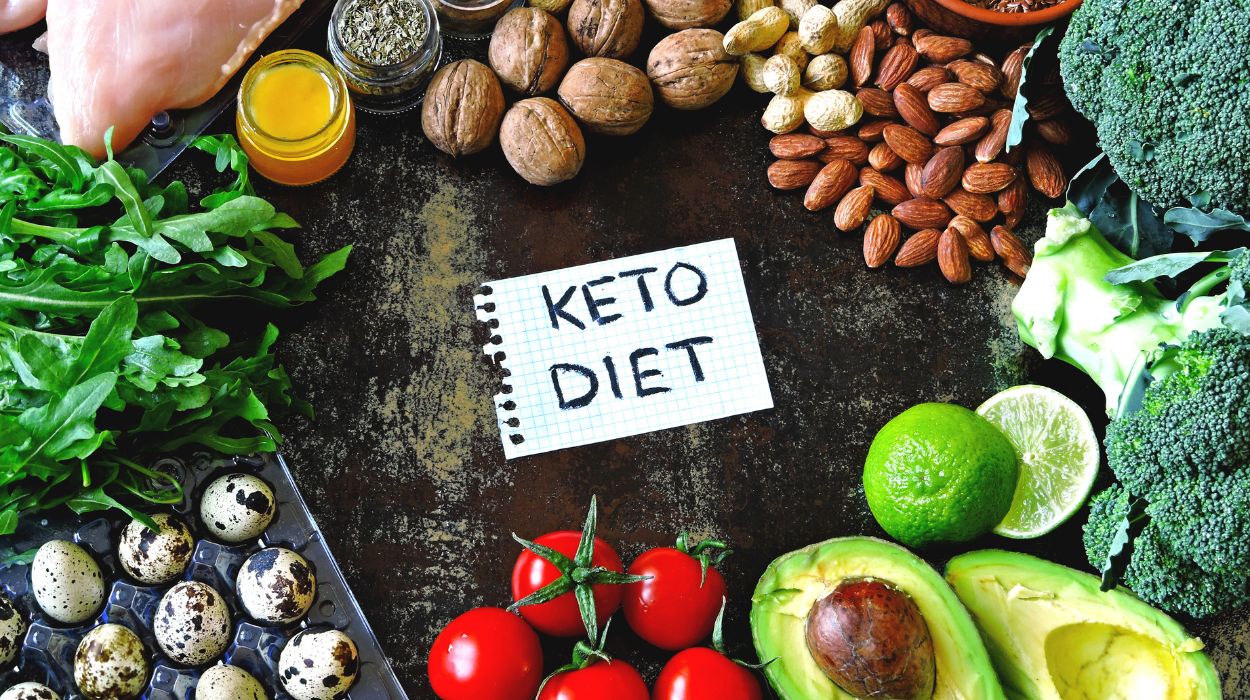 Expert's opinion
Expert's opinion
Expert's opinion
The article is a subjective view on this topic written by writers specializing in medical writing.
It may reflect on a personal journey surrounding struggles with an illness or medical condition, involve product comparisons, diet considerations, or other health-related opinions.
Although the view is entirely that of the writer, it is based on academic experiences and scientific research they have conducted; it is fact-checked by a team of degreed medical experts, and validated by sources attached to the article.
The numbers in parenthesis (1,2,3) will take you to clickable links to related scientific papers.
What Are The Basic Rules For Keto? Best Tips For Beginners 2024

If you have been considering a keto diet, you are probably aware of its peculiarity and potential benefits. Now, you’re about to have a detailed understanding of everything you need to know to achieve your keto goals. Did you know that the ketogenic diet is geared toward getting your body into a metabolic state called ketosis? This is when fat is used for energy instead of carbohydrates.
In this article, we will guide you through the basic rules of the keto diet, providing valuable tips to help you succeed. First described in the early 1920s as a way to treat epilepsy in children, the keto diet has evolved into a popular approach for many seeking to lose weight effectively. Let’s go into the essential guidelines you need to know to follow a keto low-carb diet effectively.
What Are The Basic Rules For Keto?
Many rules define the keto diet and how you can effectively follow them. Some of these rules of the classic keto diet include.[1]
- Moderate your protein intake to 30-35% of your total calories (1 gram per kilogram bodyweight in children).
- Limit carbohydrate consumption to about 5-10% net carbs per day.
- Include saturated and unsaturated fats in your diet, totaling 55-90% of calories. Note that few classical keto diets exceed 75% fat except in treating epilepsy in children.
- Test urine ketone levels if healthy and blood ketones if you have diabetes or are on insulin.
- Stay hydrated.
Continue reading to discover the benefits of the keto diet and meal plans that you can follow.
What Is The Keto Diet?

The keto diet, commonly referred to as the ketogenic diet, is a unique eating pattern that centers on reducing carbohydrate intake while increasing fat consumption, which aims to put your body in ketosis. In this state, consequent metabolic shifts occur where the body produces ketones through stored fats, which serve as an alternative fuel source for the body and brain cells. Ketosis promotes fat burning, improves type 2 diabetes, controls blood sugar levels, and enhances mental clarity.
This low-carb high-fat diet is now well known for its potential health benefits and weight loss effects. It involves eating foods such as meat, fish, eggs, nuts, oils, and non-starchy vegetables while avoiding high-carb foods such as grains, sugars, and starchy vegetables and fruits. Before embarking upon any new dietary regime, it is important to consult with a registered dietitian or physician.
Several Types Of The Keto Diet
The following are some of the well-known variations of the keto diet, each with its specific guidelines and approaches. They are:
- Targeted Ketogenic Diet (TKD).
- Standard Ketogenic Diet (SKD).
- Cyclical Ketogenic Diet (CKD).
- High-Protein Ketogenic Diet.
- Restricted Ketogenic Diet.
- Modified Ketogenic Diet.
- MCT Ketogenic Diet.[2]
- Vegan Ketogenic Diet.
- Mediterranean Ketogenic Diet.
- Dirty Keto Diet.
- Clean Keto Diet.
- Protein-Sparing Modified Fast (PSMF).
- Zero-Carb Ketogenic Diet.
- Very Low-Calorie Ketogenic Diet (VLCKD)
- Modified Atkins Diet (MAD).
Great Health Benefits Of The Keto Diet Foods
Support Weight Loss
In the realm of health benefits, one notable advantage of the keto diet lies in its potential to facilitate fat loss. By following a low carbohydrate diet, commonly called a keto diet, individuals can induce a state of ketosis where the body primarily uses stored fat as an energy source, resulting in gradual weight loss.
Brain Health
The ketogenic diet may support ketogenic brain health and have neuroprotective effects. Studies[3] have shown that the ketogenic diet can positively impact cognitive function and neurological disorders.
Appetite Suppression
Ketogenic diets also reduce overall appetite, making it easy to shed weight. The high-fat, low-carbohydrate nature of the diet keeps you feeling full and satisfied for longer periods. Fats take longer to digest and provide sustained energy, reducing hunger pangs.
Improved Skin Health
As a great routine for skin care, some people have experienced reduced acne[4] while following the keto diet. The diet’s low-carbohydrate intake helps regulate hormone levels, such as insulin, which can contribute to acne development. Additionally, the emphasis on nutrient-dense foods like low-carb vegetables, essential fatty acids, and adequate protein provides essential nutrients and antioxidants that support overall skin health.
Keto Rules You Need To Follow

Eat Certain Foods
- Eggs.
- Vegetables: non-starchy such as broccoli and asparagus.
- Beverages: calorie-free, such as kombucha and coffee.
- Meat: Beef, pork, lamb, poultry, and other meats are excellent sources of protein and healthy fats.
- Fish and Seafood: Salmon, trout, tuna, shrimp, and other fatty fish.
- Nuts and Seeds: Almonds, walnuts, chia seeds, flax seeds.
- Avocados.
- Healthy Oils: Olive oil, coconut oil, avocado oil, and the best MCT oils.
- Full-Fat Dairy: Cheese, butter, cream, and full-fat yogurt.
- Berries: Limited quantities of berries like strawberries, raspberries, and blackberries.
Check Your Ketone Levels
Checking your ketone level is an important aspect of following a ketogenic diet. It helps you ensure that your body has entered a state of ketosis. You can use a couple of methods to check your ketone levels.
- One way is by using urine testing strips. These strips are designed to detect the presence of ketones in your urine. You simply hold the strip under your urine stream or dip it into a urine sample. The strip will change color to indicate the level of ketones present. For most healthy adults, this is the method of choice.
- Another option is a blood ketone meter, which provides a more accurate measurement of ketone levels. This involves pricking your finger and placing a drop of blood onto a test strip, which is then inserted into the meter. The meter will provide you with a precise reading of your ketone levels. This method is recommended for those with uncontrolled diabetes or anyone on insulin.
Checking your ketone level regularly can help you assess your progress and make any necessary adjustments to your diet. Ketone levels can vary depending on factors such as individual metabolism, activity levels, medical conditions, and the specific foods you consume.
Limit Carbohydrate Intake
Limiting carbohydrate intake is a fundamental rule of the ketogenic diet. By keeping your carbohydrate intake low, typically below 50 grams per day or even lower for stricter versions, you encourage your body to enter a state of ketosis.
When you consume less carbohydrates, your body’s glycogen stores become depleted. As a result, it starts breaking down stored fat into ketones, which are then used as an alternative energy source. Restricting carbohydrates forces your body to rely on fat for fuel, leading to weight loss and other health benefits.
Moderate Protein Intake
Moderating protein intake is another important rule to follow when on a ketogenic diet. While protein is an essential nutrient that supports body maintenance and repair, excessive protein intake can potentially hinder the process of ketosis.
When you consume too much protein, your body can convert the excess amino acids into glucose through gluconeogenesis.[5] Glucose is a primary energy source for the body. If it is readily available, your body may preferentially use glucose for fuel instead of relying on ketones derived from fat metabolism. This can disrupt the state of ketosis and hinder your progress on the ketogenic diet.
Keto Diet What To Eat? A Sample Of A Meal Plan
Monday
- Breakfast: Spinach and mushroom omelet cooked in coconut oil
- Lunch: Grilled chicken Caesar salad with homemade keto-friendly dressing
- Dinner: Baked salmon with roasted Brussels sprouts and garlic butter
Tuesday
- Breakfast: Bacon and eggs with sliced avocado
- Lunch: Zucchini noodles with pesto sauce and grilled chicken
- Dinner: Baked chicken thighs with roasted asparagus
Wednesday
- Breakfast: Keto-friendly smoothie with almond milk, spinach, avocado, and protein powder
- Lunch: Tuna salad lettuce wraps with mayo and diced pickles
- Dinner: Steak with roasted cauliflower and sautéed mushrooms
Thursday
- Breakfast: Scrambled eggs with bacon and avocado slices
- Lunch: Cauliflower fried rice with shrimp
- Dinner: Grilled steak with cauliflower mash and steamed broccoli
Friday
- Breakfast: Coconut flour pancakes with sugar-free syrup
- Lunch: Chicken fajita bowl with cauliflower rice and guacamole
- Dinner: Baked cod with lemon butter sauce and sautéed spinach
Saturday
- Breakfast: Sausage and vegetable scramble
- Lunch: Greek salad with grilled chicken and feta cheese
- Dinner: Baked turkey meatballs with zucchini noodles and marinara sauce
Sunday
- Breakfast: Avocado and bacon breakfast sandwich (Using lettuce wraps instead of bread)
- Lunch: Salmon salad with mixed greens and avocado
- Dinner: Grilled pork chops with roasted cauliflower and green beans
It is important to note that this is just a sample meal plan, and individual preferences and dietary needs may vary.
Supplements That Are Helpful For A Keto Diet
While obtaining nutrients from whole foods is generally best, some supplements effectively complement a keto diet. Here are a few that may be helpful:
- Creatine.
- MCT Oil.
- Electrolyte Supplements (Sodium, potassium, magnesium).
- Omega-3 Fatty Acid Supplements (Fish oil, algae oil)[6]
- Vitamin D.
- Green Tea Extract.
- Turmeric/Curcumin.
- Alpha-lipoic acid.
- N-Acetyl Cysteine (NAC).
- L-Glutamine.
- Melatonin.
Bottom Line
Keto dieting is a great way to lose weight and improve overall health. By restricting carbs, increasing healthy fats, and limiting protein, the body enters ketosis and burns fat for energy. This metabolic shift is responsible for the improvement in the overall functioning of the body.
Staying hydrated, monitoring ketone levels, and planning meals can also help you reach your keto dieting objectives. To ensure a new diet is right for you, consult your healthcare provider first.
Frequently Asked Questions
Yes, but you should start by drastically reducing your carb intake. After the initial two to three months of the diet, you can consume carbs on special occasions as long as you get back on track immediately.
Normally, most eating plans may lead to muscle loss, but weight training sessions and a diet high in protein and ketones may reduce muscle loss.
Protein intake should be kept moderate because doing so can cause insulin levels to rise and ketones to drop. The maximum might be around 10-20% of daily calorie consumption.
It’s possible that you’re not fully using fats and ketones. Consider revisiting the aforementioned suggestions and reducing your carb intake to combat this. MCT oil or ketones are two supplements that have shown promise.
Don’t freak out. This is because byproducts of ketosis are flushed out of the body during this process.
This is a rather typical adverse effect. You could try sugar-free gum or water with natural flavorings.
After around three to four weeks, this frequent symptom typically disappears. Increase your intake of high-fiber vegetables if the problem persists.
+ 6 sources
Health Canal avoids using tertiary references. We have strict sourcing guidelines and rely on peer-reviewed studies, academic researches from medical associations and institutions. To ensure the accuracy of articles in Health Canal, you can read more about the editorial process here
- Domenico Di Raimondo, Buscemi, S., Gaia Musiari, Rizzo, M., Edoardo Pirera, Davide Corleo, Pinto, A. and Antonino Tuttolomondo (2021). Ketogenic Diet, Physical Activity, and Hypertension—A Narrative Review. Nutrients, [online] 13(8), pp.2567–2567. doi:https://doi.org/10.3390/nu13082567.
- Yeou-mei Christiana Liu (2008). Medium-chain triglyceride (MCT) ketogenic therapy. Epilepsia, [online] 49, pp.33–36. doi:https://doi.org/10.1111/j.1528-1167.2008.01830.x.
- Dyńka, D., Katarzyna Kowalcze and Agnieszka Paziewska (2022). The Role of Ketogenic Diet in the Treatment of Neurological Diseases. [online] 14(23), pp.5003–5003. doi:https://doi.org/10.3390/nu14235003.
- Paoli, A., Grimaldi, K., Toniolo, L., Canato, M., Bianco, A. and Fratter, A. (2012). Nutrition and Acne: Therapeutic Potential of Ketogenic Diets. Skin Pharmacology and Physiology, [online] 25(3), pp.111–117. doi:https://doi.org/10.1159/000336404.
- Manninen, A.H. (2004). Metabolic Effects of the Very-Low-Carbohydrate Diets: Misunderstood ‘Villains’ of Human Metabolism. [online] 1(2). doi:https://doi.org/10.1186/1550-2783-1-2-7.
- Liu, S.-H., Chen, Y., Tzeng, H.-P. and Chiang, M.-T. (2022). Fish Oil Enriched n-3 Polyunsaturated Fatty Acids Improve Ketogenic Low-Carbohydrate/High-Fat Diet-Caused Dyslipidemia, Excessive Fat Accumulation, and Weight Control in Rats. [online] 14(9), pp.1796–1796. doi:https://doi.org/10.3390/nu14091796.



